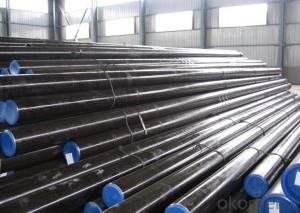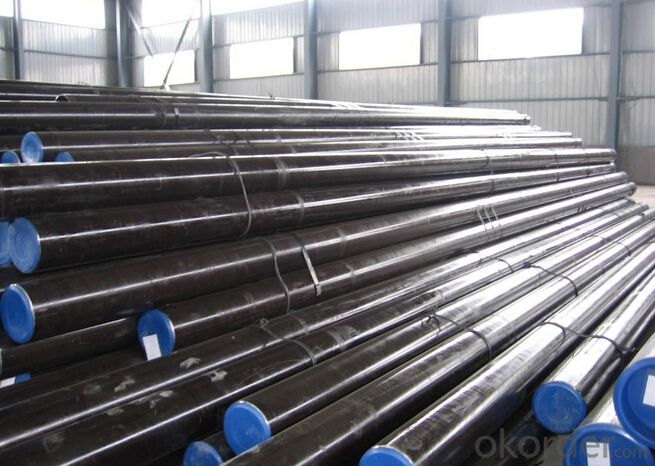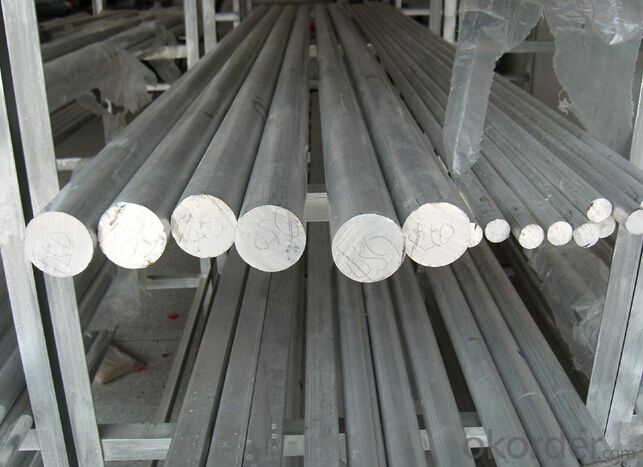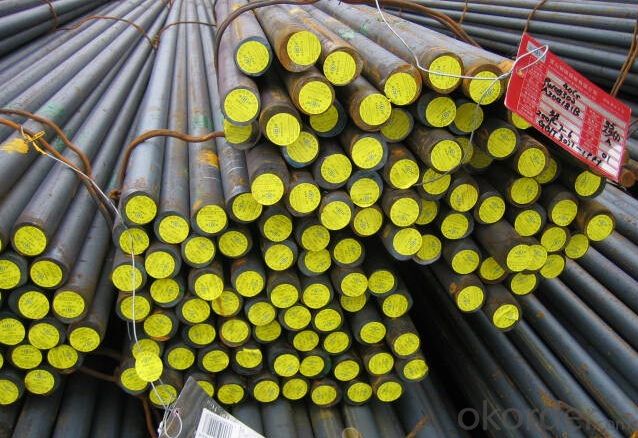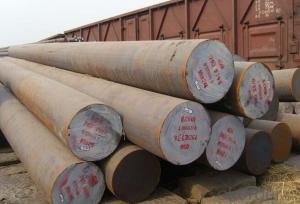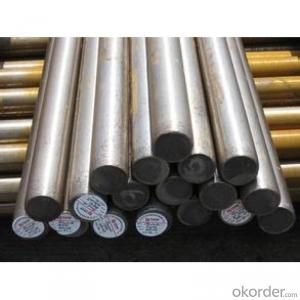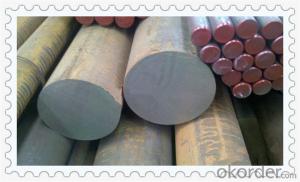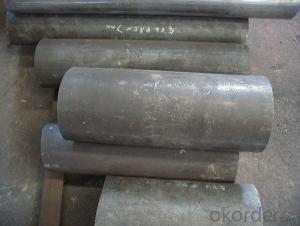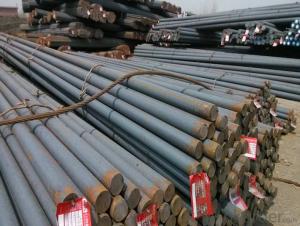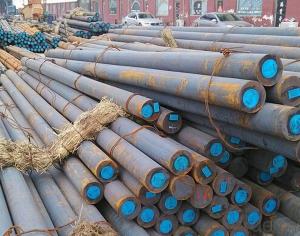SAE 1020 Round Steel Bars Special Steel
- Loading Port:
- China main port
- Payment Terms:
- TT OR LC
- Min Order Qty:
- 30 m.t.
- Supply Capability:
- 10000 m.t./month
OKorder Service Pledge
OKorder Financial Service
You Might Also Like
Specification
Products description details
1. Chemical Composition (%)
C | Si | Mn | Cr | Ni | Cu | P | S |
0.17-0.23 | 0.17-0.37 | 0.35-0.65 | ≤0.25 | ≤0.30 | ≤0.25 | ≤0.035 | ≤0.035 |
2. Mechanical Properties
Tensile strength | Yield strength | Elongation rate | Contractibility rate | Hardness(HB) |
≥410MPa | ≥245MPa | ≥25% | ≥55% | ≤156(without heat treatment) |
3. Standard
GB:20, AISI: 1020, JIS: S20C
4. Specification
Dia: 8mm-480mm or according to your requirements
Length: 1m-12mm or according to your requirements
5. Delivery Condition
Hot rolled, forged, QT heat treatment and normalizing
6. Payment term
T/T, L/C or we can negotiate.
7. Delivery time
20days after the order confirmed
8. Characteristics
1) The strength and hardness of S20C/ 1020/ 20 is higher than that of S15C/ 1015/ 15.
2) Good plasticity and weldability.
3) Good toughness after hot rolling and normalization.
9. Application
High-quality carbon structural steel/S20C/ 1020/ 20
S20C structural carbon steel bar /1020 /20 can be used to be manufactured medium or small carburization or nitrocarburizing parts and press forging parts, such as lever shaft, selector fork of speed changing box, gear, heavy mechanical lever and shackle, etc.
Product show
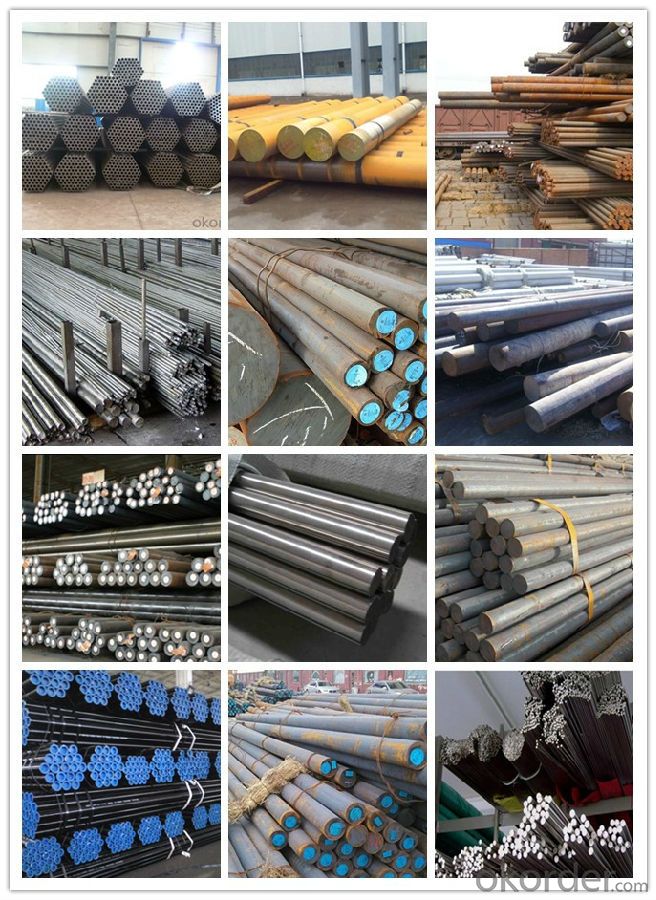
Workshop show
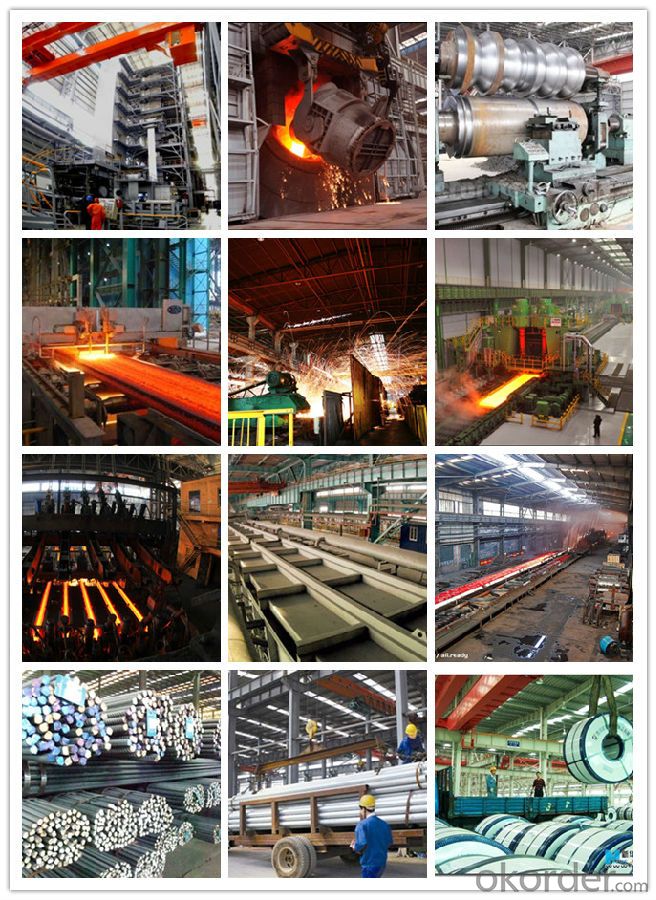
Why choose us?
(1) The leading exporter in China special steel industry.
(2) Large stocks for various sizes, fast delivery date.
(3) Good business relationship with China famous factories.
(4) More than 7 years steel exporting experience.
(5) Good after-sales service guarantee.
- Q: Can special steel be used in the oil and gas industry?
- Yes, special steel can be used in the oil and gas industry. It is often utilized in the construction of pipelines, drilling equipment, and offshore platforms due to its high strength, corrosion resistance, and ability to withstand extreme temperatures and pressures.
- Q: What are the specific requirements for special steel used in the defense armor industry?
- The specific requirements for special steel used in the defense armor industry are as follows: 1. High strength: Special steel used in defense armor must possess exceptional strength to withstand the impact of projectiles and explosives. It should be able to resist deformation and penetration under extreme conditions. 2. Hardness: The steel should have high hardness to provide resistance against cutting, drilling, or other forms of mechanical damage. This property ensures that the armor can withstand attacks and prevent penetration. 3. Toughness: Special steel needs to exhibit toughness, which allows it to absorb and dissipate the energy generated from impacts. This property helps to minimize the damage caused by projectiles and explosions. 4. Ballistic resistance: The steel should possess excellent ballistic resistance to effectively stop or deflect projectiles. It should be able to absorb and distribute the impact energy over a larger area, reducing the likelihood of penetration. 5. Corrosion resistance: Defense armor is exposed to various environmental conditions, including moisture and chemicals. Therefore, the special steel used in defense armor must have high corrosion resistance to ensure its longevity and effectiveness. 6. Weldability: The steel should be easily weldable to allow for the construction of complex armor structures. Weldability ensures that the armor can be conveniently assembled, repaired, or modified as per the specific requirements. 7. Heat resistance: Defense armor may need to withstand high temperatures generated from explosions or intense fire. Special steel should possess heat resistance to maintain its structural integrity and protective capabilities under such extreme conditions. 8. Lightweight: While maintaining the above properties, special steel should also be lightweight to ensure ease of mobility for soldiers and vehicles. The armor should not hinder movement or impose excessive weight burdens. Meeting these requirements is crucial to ensure the effectiveness and reliability of defense armor in providing protection to military personnel and assets.
- Q: Can special steel be used in the manufacturing of tools?
- Yes, special steel can be used in the manufacturing of tools. Special steel, also known as alloy steel, is specifically designed to have enhanced properties such as high strength, hardness, and resistance to wear and corrosion. These characteristics make it an ideal material for the production of durable and high-performance tools used in various industries, including automotive, construction, and machinery.
- Q: How does the composition of special steel affect its mechanical properties?
- The composition of special steel significantly affects its mechanical properties. Various alloying elements such as carbon, manganese, chromium, nickel, and others are added in specific quantities to enhance the steel's strength, hardness, toughness, and corrosion resistance. The presence and ratio of these elements determine the steel's microstructure, which in turn determines its mechanical properties. For example, higher carbon content increases hardness and strength, while manganese improves toughness. Similarly, chromium and nickel increase corrosion resistance and provide better heat resistance. Therefore, the composition of special steel plays a crucial role in defining its mechanical properties.
- Q: How does special steel contribute to the aerospace landing gear industry?
- The aerospace landing gear industry relies heavily on special steel to ensure safe and efficient aircraft landings. Special steel is essential for providing the required strength, durability, and resistance to extreme conditions. One vital aspect of landing gears is their high tensile strength, as they bear the weight of the aircraft during takeoff, landing, and taxiing. Special steel alloys, such as ultra-high strength steels, are specifically engineered to resist deformation and endure the immense forces exerted on the landing gear. These steels possess remarkable mechanical properties, enabling them to maintain their structural integrity under heavy loads. Additionally, special steel used in aerospace landing gears must exhibit exceptional fatigue resistance to withstand the repeated stress cycles experienced during each landing. Fatigue failure of landing gears can have catastrophic consequences, so the use of high-quality steel ensures an extended service life and reduces the risk of failure. Moreover, special steel alloys used in landing gears must possess outstanding corrosion resistance. Aircraft operate in diverse environments, including humid and salty conditions, which can accelerate corrosion. By utilizing corrosion-resistant steels, the landing gear components can endure these harsh conditions and maintain their performance and safety over time. Furthermore, the unique properties of special steel alloys allow for weight reduction in landing gear components. The aerospace industry constantly strives to decrease aircraft weight to enhance fuel efficiency and performance. Special steel alloys, such as high-strength low-alloy (HSLA) steels, provide the perfect balance between strength and weight, enabling the design of lighter landing gear components without compromising safety or durability. In conclusion, special steel is indispensable to the aerospace landing gear industry due to its ability to provide the necessary strength, fatigue resistance, corrosion resistance, and weight reduction capabilities required for safe and efficient aircraft landings. By utilizing special steel alloys, the industry can ensure the reliability and longevity of landing gear components, thereby contributing to the overall safety and performance of aircraft.
- Q: What are the standards and certifications for special steel?
- Some of the standards and certifications for special steel include ISO 9001 for quality management systems, ISO 14001 for environmental management systems, and ISO 45001 for occupational health and safety management systems. Additionally, there are various industry-specific standards such as ASTM International, EN standards, and JIS standards that provide specifications and testing requirements for different types of special steel. These standards and certifications ensure that the special steel meets specific quality, safety, and environmental standards, and helps to establish trust and credibility in the industry.
- Q: How does special steel perform in dynamic loading conditions?
- Thanks to its high strength, toughness, and fatigue resistance, special steel excels in dynamic loading scenarios. When exposed to repeated and fluctuating stresses, special steel can endure the impact and maintain its mechanical properties without any setbacks or distortions. The distinct composition and processing techniques employed in the production of special steel, including the addition of alloying elements and heat treatment, significantly bolster its ability to withstand dynamic loading. Consequently, special steel proves to be an optimal material for applications that involve dynamic forces, such as automotive components, machinery parts, and structural elements utilized in construction. The exceptional performance of special steel under dynamic loading conditions guarantees durability, reliability, and safety across various industries.
- Q: What is the impact of carburizing on the properties of special steel?
- The process known as carburizing, or case hardening, is utilized to introduce carbon into the surface layer of special steel, resulting in several beneficial effects. Firstly, carburizing forms a tough outer layer, called the case, which is carbon-rich. The infusion of carbon atoms into the steel matrix during carburizing increases the carbon content on the surface, leading to a higher level of hardness compared to the core. This hardened case provides exceptional resistance against wear, abrasion, and surface fatigue, making it ideal for applications requiring high durability, such as gears, camshafts, and bearings. Moreover, carburizing enhances the strength of the steel by improving its ability to form martensite, a hard, crystalline structure. This transformation contributes further to the hardness and strength of the carburized steel, making it suitable for applications necessitating high load-bearing capacity, like shafts and axles. Furthermore, carburizing has the potential to improve the fatigue resistance of special steel. The hardened case created during the carburizing process helps distribute stress evenly across the surface, reducing the probability of crack initiation and propagation. This enhanced resistance to fatigue failure makes carburized steel appropriate for components exposed to cyclic loading, such as gears and springs. However, it is important to acknowledge that carburizing also has its drawbacks. The higher carbon content on the surface can reduce the material's ductility and toughness, making it more susceptible to brittle fracture. To address this issue, it is common practice to utilize steel with a lower carbon content for the core, ensuring a balance between hardness and toughness. In conclusion, carburizing significantly impacts the properties of special steel, enhancing hardness, wear resistance, and strength, which is advantageous for applications requiring durability, high load-bearing capacity, and fatigue resistance. Nevertheless, careful control of the process is necessary to maintain a balance between hardness and toughness, ensuring the overall performance and reliability of the material.
- Q: How is special steel used in the telecommunications industry?
- Special steel is used in the telecommunications industry to manufacture various components and infrastructure. It is primarily utilized in the production of transmission towers, antenna masts, and other supporting structures for telecommunication equipment. The high strength and durability of special steel make it suitable for withstanding extreme weather conditions and providing stability to the telecommunications network. Additionally, special steel is also used in the manufacturing of cables, connectors, and other smaller components that are crucial for efficient signal transmission and communication in the industry.
- Q: How does special steel contribute to the aerospace noise reduction?
- Special steel contributes to aerospace noise reduction in several ways. Firstly, special steel alloys can be used to manufacture components such as aircraft engine parts and exhaust systems that are specifically designed to minimize noise generation. These alloys possess properties like high strength and heat resistance, enabling them to withstand the extreme conditions inside an aircraft engine while reducing noise emissions. Additionally, special steel can be utilized in the construction of aircraft structures and panels. By incorporating specific types of steel with sound-dampening properties, the transmission of noise through the fuselage can be minimized. This helps to reduce the noise experienced by passengers and crew, leading to a quieter and more comfortable flight experience. Furthermore, special steel can be employed in the manufacturing of vibration-damping components within aircraft systems. Vibrations generated by various mechanical systems can contribute to overall noise levels. By utilizing steel alloys with excellent damping properties, these vibrations can be absorbed and minimized, thereby reducing noise levels. In summary, special steel plays a crucial role in aerospace noise reduction by enabling the manufacturing of noise-reducing components, providing sound-dampening properties to aircraft structures, and minimizing vibrations that contribute to overall noise levels.
Send your message to us
SAE 1020 Round Steel Bars Special Steel
- Loading Port:
- China main port
- Payment Terms:
- TT OR LC
- Min Order Qty:
- 30 m.t.
- Supply Capability:
- 10000 m.t./month
OKorder Service Pledge
OKorder Financial Service
Similar products
Hot products
Hot Searches
Related keywords
